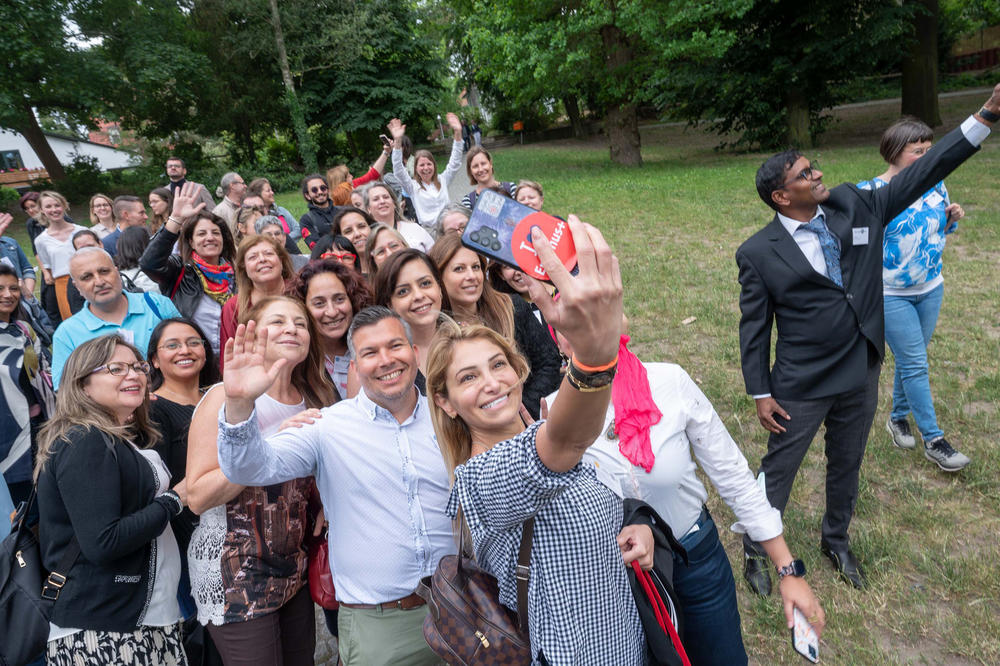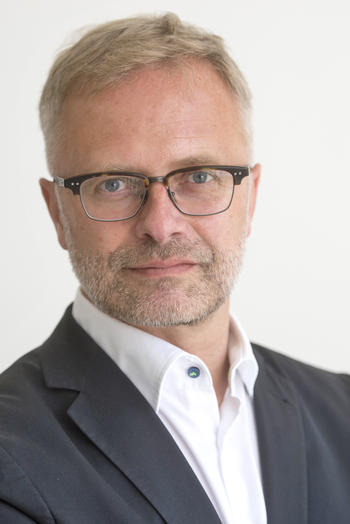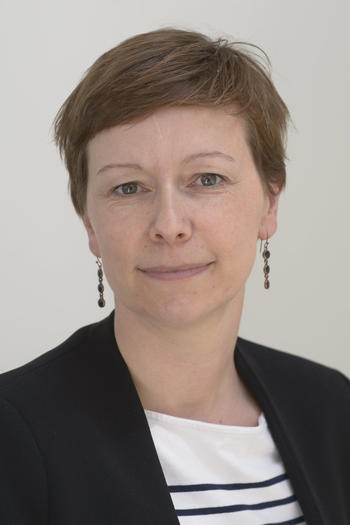“Internationalization’s the Name of the Game – Now More Than Ever!”
Britta Piel and Herbert Grieshop address the DAAD budget cuts, and how internationalization can still flourish in these trying times
Jul 27, 2022
Internationality in action: Universities employees from thirty-five countries came together for Staff Training Week at Freie Universität Berlin in June.
Image Credit: Bernd Wannenmacher
Academia in Germany is in a state of turmoil. Following the German Federal Ministry of Education and Research’s announcement that it would be cutting funding and even discontinuing ongoing projects, the German Academic Exchange Service (DAAD) declared on its website that “[it] is highly likely to be facing extensive budget cuts,” meaning that “its scholarships and mobility funding in projects at German higher education institutions must therefore be significantly reduced at short notice,” whereby “around 6,000 scholarships alone could be canceled.”
What will this mean for Freie Universität Berlin – where the sheer diversity of international cooperation measures it has in place has become a hallmark? Dr. Herbert Grieshop, director of International Affairs, and Britta Piel, head of the Center for International Cooperation at Freie Universität Berlin, describe the impacts of the decision and how important internationalization is to the university.
How will Freie Universität Berlin be impacted by the DAAD budget cuts?
Dr. Herbert Grieshop is the director of International Affairs at Freie Universität Berlin.
Image Credit: Bernd Wannenmacher
Herbert Grieshop: The INTEGRA program with which we have been able to fund programs and language courses for students who are refugees over the past few years will be canceled. It’s dealt a massive blow to our work. Since 2015, we’ve been able support sixty to seventy refugees each year through INTEGRA. We were banking on it being continued so that we could help refugees from Ukraine.
That’s on top of other programs being cut, especially individual grants like those for early-career researchers at Freie Universität Berlin who have applied for DAAD funding to travel to attend conferences and hold lectures. This funding will be cut off with immediate effect.
Anyone who wants to come to Freie Universität Berlin with a DAAD scholarship or wants to go abroad will now have a significantly reduced range of funding options available to them. Then there’s the ongoing DAAD projects financed by the German Federal Foreign Office – ten percent of which are already on the chopping block this year alone.
Is there any way of bridging the gap?
Herbert Grieshop: Well, in terms of INTEGRA’s funding being canceled, we’re hoping to apply for alternative funding from the Berlin Senate. For ongoing DAAD projects we can make up for the missing funding on a temporary basis using money from our current budget if needed. This is where funding that we weren’t able to spend during the pandemic will come in handy. Unfortunately, we’re finding it difficult to predict how things will turn out in the long run.
Plus, the university can’t compensate for the cuts to scholarships that the DAAD financed. However, we’ve managed to find a stopgap measure. In the next few days we’ll be sending an email to researchers at Freie Universität about an “internationalization booster,” offering them funding from the money that we managed to save during the pandemic. New and existing projects can be launched or further developed with the aid of this booster.
What exactly does “internationality” – a term that has been closely associated with Freie Universität Berlin since its founding and which forms a cornerstone of your internationalization strategy – signify in these troubled times?
Herbert Grieshop: These are indeed troubled times, whichever way you look at it. We are witnessing a horrific war unfold in Europe; in this sense, internationality means solidarity with refugees from Ukraine, with students and researchers from the country, and with its institutions. Since the outbreak of the war we have allocated over forty scholarships to researchers from Ukraine who are refugees, and who now either live in Berlin or are internally displaced within Ukraine.
In contrast, internationality in terms of the pandemic and post-pandemic era means global cooperation in research. For example, universities took a pioneering role in developing and researching Covid-19 vaccines.
Britta Piel is the head of the Center for International Cooperation at Freie Universität Berlin.
Image Credit: Bernd Wannenmacher
Britta Piel: The phrase “troubled times” could just as easily be used to refer to climate change. We learned a lot that relates to climate change from the pandemic, namely that global crises can’t be solved on a local level – and that’s why we need international cooperation.
Over the last two-and-a-half years we’ve learned how to make sure that internationality remains a top priority while at the same time taking steps to tackle climate change thanks to digital formats, which have allowed us to travel less while still maintaining close contact with our partners. Thanks to our Liaison Offices in Egypt, Brazil, China, India, and Eastern Europe, we also have outposts across the world that can act on the behalf of Freie Universität directly on site.
What’s the primary focus of International Affairs at Freie Universität Berlin at the moment?
Britta Piel: One project that we’re excited to see take off is Una Europa. By joining this university network, we’ve seized an incredible opportunity. It involves taking joint action together with ten like-minded European partners, allowing us to join forces in areas such as research and teaching, promoting student exchange, and cooperating digitally. All eleven partners are located in relatively close proximity to each other, and we’re dedicated to European ideals like cooperation across borders and academic freedom.
Herbert Grieshop: We’re preoccupied with supporting refugees for the foreseeable future. The issue of global responsibility will form the overarching theme of our work in the coming years.
But we also have the usual tasks of any international office to focus on. We want student exchanges to return to pre-pandemic numbers, although there are still countries like China that are “closed.” We’re doing everything we can to make sure that students can spend a semester or a year abroad in these countries.
Another area of interest for us is cooperation with the Global South, which we’re involved in through the Berlin University Alliance’s Berlin Center for Global Engagement. There are plenty of things happening at Freie Universität, but they lack visibility.
We’d like to shift our focus to Africa, as we’ve just acquired 200,000 euros via Erasmus+ Worldwide for cooperation projects on the continent. We still don’t have very many students from Africa, which could also have something to do with the subjects we have on offer here at Freie Universität, because we don’t have any tropical medicine courses or agricultural science options with a focus on subtropical regions.
Britta Piel: Last, but not least, we’ve stated in our internationalization strategy that we want to dismantle structural barriers that stand in the way of greater internationalization at Freie Universität Berlin.
Could you give us an example?
Britta Piel: In a word: Campus Management. Our student admin system is only available in German. But many of our students are enrolled in degree programs that are taught through English and don’t have any German language requirements. These students really struggle with this system. It produces a great deal of frustration, especially since it increases the workload for many employees at Freie Universität Berlin who work in student services. All of this drains resources and stunts our progress when it comes to internationalization.
What other obstacles stand in your way?
Britta Piel: Many researchers at Freie Universität cooperate with international partners in their teaching by offering joint digital courses, for example. They have individually collected a wealth of knowledge and skills on how to do this, but it tends to be piecemeal work done case by case. We would like to compile people’s experiences in a handbook: a step-by-step guide on what needs to be done in collaborative learning with international partners, tailor-made for the situation at Freie Universität. This is a project that we would definitely like to tackle this year.
How could this be set in motion?
Britta Piel: By means of a joint application with eight other Berlin institutions of higher education, we’ve managed to secure a position for a “Collaborative Online International Learning” administrator. The person in this role will collect and compare good examples of these kinds of projects, support instructors who want to conduct pilot projects, and find cohesive solutions for structural barriers with other partners, such as accreditation.
Thirst-eight percent of doctoral candidates and twenty percent of students at Freie Universität Berlin come from outside of Germany. The university maintains a whole host of cooperation and exchange programs with partner universities all over the world; employees have the opportunity to go abroad through Una Europa and the Erasmus Staff Exchange Program. Is Freie Universität unique within Germany in this respect? I mean, international affairs and internationalization are becoming increasingly important at many universities.
Herbert Grieshop: Internationality is important for all universities and for all university members, whether they’re employees, students, or researchers. But at Freie Universität Berlin internationality is a central aspect of our identity, and all of our members have a really strong attachment to it.
Britta Piel: Internationality is what we live and breathe. I have never had to tell anyone here just how essential internationality is.
What specifically has International Affairs done in order to strengthen internationalization in light of the DAAD budget cuts?
Herbert Grieshop: Our motto is “Internationalization’s the name of the game – now more than ever!” That’s our response to the cuts. We’re hoping to bridge the gap for the time being with things like the booster, as I mentioned above. You can find an overview of our broad spectrum of funding measures here.
Christine Boldt conducted the interview.
This article originally appeared in German on July 21, 2022, in campus.leben, the online magazine of Freie Universität Berlin.
Further Information
Freie Universität Berlin views itself as an international university with an expansive global network. As an educational establishment, it prides itself on its willingness to assume responsibility on a regional, national, and global scale. The university sees its founding principles of “Veritas, Iustitia, Libertas” not as mere words, but as values shaping its goals and strategies now and in the future: by connecting and educating people across the world; by campaigning for a global development based on sustainability and social justice; by engaging with current global challenges and integrating global perspectives in its research and teaching. As a cosmopolitan institution, working internationally is an everyday experience at Freie Universität Berlin.
There is a huge variety of options for university members who would like to experience and benefit from internationality in research, teaching, studying, and everyday work:
- Funding Opportunities for International Projects and Cooperation Activities
- Training Programs for Administrative Staff
- Studying Abroad
- Services of Our International Liaison Offices
- Opportunities for At-Risk and Refugee Students and Scholars



